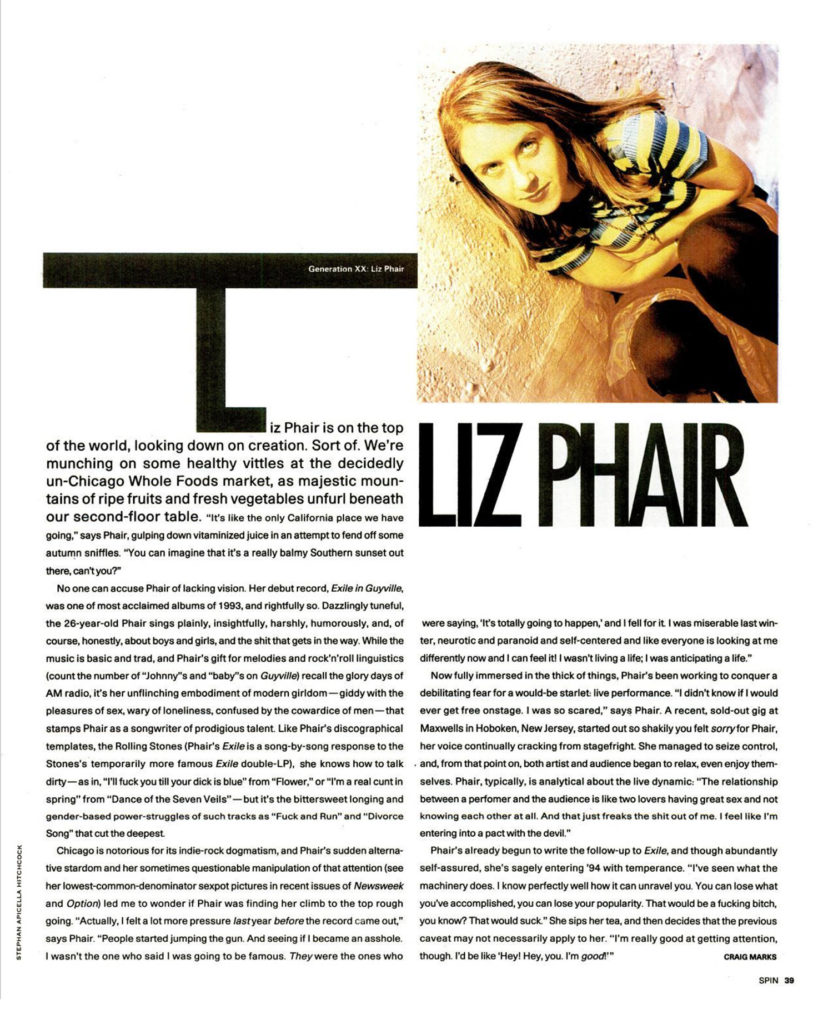By Craig Marks
Spin, January 1994


Liz Phair is on top of the world, looking down on creation. Sort of. We’re munching on some healthy vittles at the decidedly un-Chicago Whole Foods market, as majestic mountains of ripe fruits and fresh vegetables unfurl beneath our second-floor table. “It’s like the only California place we have going,” says Phair, gulping down vitaminized juice in an attempt to fend off some autumn sniffles. “You can imagine that it’s a really balmy Southern sunset out there, can’t you?”
No one can accuse Phair of lacking vision. Her debut record, Exile in Guyville, was one of most acclaimed albums of 1993, and rightfully so. Dazzlingly tuneful, the 26-year-old Phair sings plainly, insightfully, harshly, humorously, and, of course, honestly, about boys and girls, and the shit that gets in the way. While the music is basic and trad and Phair’s gift for melodies and rock’n’roll linguistics (count the number of “Johnny”s and “baby”s on Guyville) recall the glory days of AM radio, it’s her unflinching embodiment of modern girldom — giddy with the pleasures of sex, wary of loneliness, confused by the cowardice of men — that stamps Phair as a songwriter of prodigious talent. Like Phair’s discographical templates, the Rolling Stones (Phair’s Exile is a song-by-song response to the Stones’ temporarily more famous Exile double-LP), she knows how to talk dirty — as in, “I’ll fuck you till your dick is blue” from “Flower”, or “I’m a real cunt in spring” from “Dance of the Seven Veils” — but it’s the bittersweet longing and gender-based power-struggles of such tracks as “Fuck and Run” and “Divorce Song” that cut the deepest.
Chicago is notorious for its indie-rock dogmatism, and Phair’s sudden alternative stardom and her sometimes questionable manipulation of that attention (see her lowest-common-denominator sexpot pictures in recent issues of Newsweek and Option) led me to wonder if Phair was finding her climb to the top rough going. “Actually, I felt a lot more pressure last year before the record came out,” says Phair. “People started jumping the gun. And seeing if I became an asshole. I wasn’t the one who said I was going to be famous. They were the ones who were saying, ‘It’s totally going to happen,’ and I fell for it. I was miserable last winter, neurotic and paranoid and self-centered, and like everyone is looking at me differently now and I can feel it! I wasn’t living a life; I was anticipating a life.”
Now fully immersed in the thick of things, Phair’s been working to conquer a debilitating fear for a would-be starlet: live performance. “I didn’t know if I would ever get free onstage. I was so scared,” says Phair. A recent, sold-out gig at Maxwells in Hoboken, New Jersey, started out so shakily you felt sorry for Phair, her voice continually cracking from stagefright. She managed to seize control, and, from that point on, both artist and audience began to relax, even enjoy themselves. Phair, typically, is analytical about the live dynamic: “The relationship between a performer and the audience is like two lovers having great sex and not knowing each other at all. And that just freaks the shit out of me. I feel like I’m entering into a pact with the devil.”
Phair’s already begun to write the follow-up to Exile, and though abundantly self-assured, she’s sagely entering ’94 with temperance. “I’ve seen what the machinery does. I know perfectly well how it can unravel you. You can lose what you’ve accomplished, you can lose your popularity. That would be a fucking bitch, you know? That would suck.” She sips her tea, and then decides that the previous caveat may not necessarily apply to her. “I’m really good at getting attention, though. I’d be like, ‘Hey! Hey, you. I’m good!'”
Featured Image: Liz Phair. Photograph by Stephan Apicella Hitchock.






